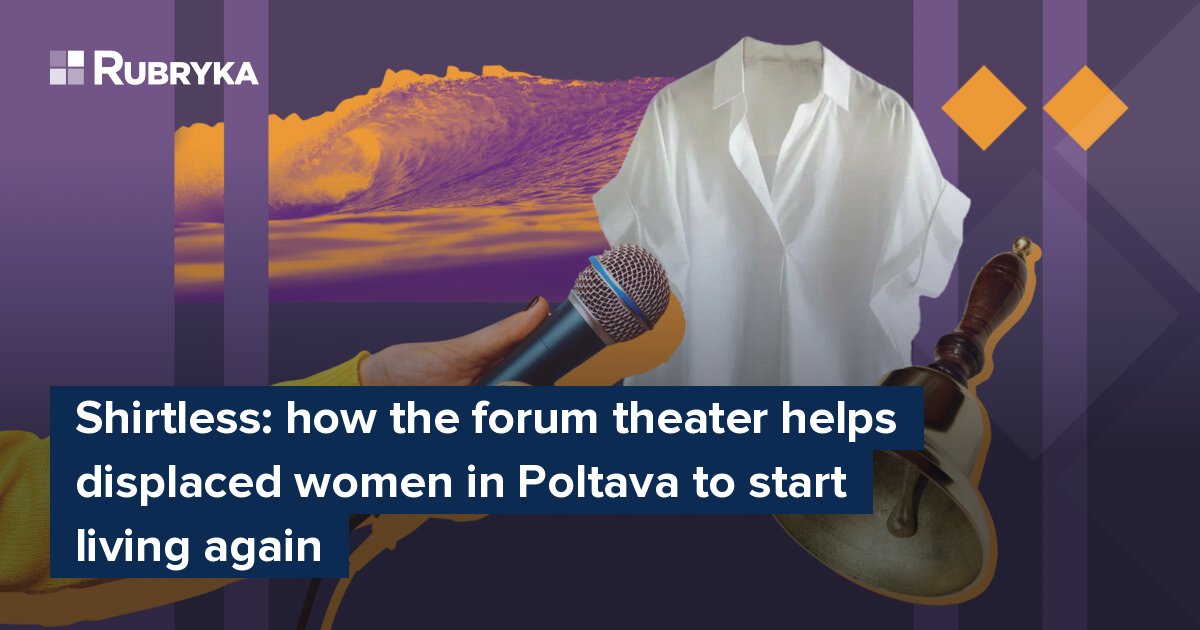
What is the problem?
Olena Podosetnykova is from Mariupol. Together with her family, she left the city on March 18, two days after the Russians bombed the Mariupol Drama Theater while hundreds of people were hiding in its bomb shelter. Before the war, Podosetnykova dreamed of converting her two-bedroom apartment into a studio. The war became the "infernal architect" who "handled" this job when a missile flew straight into the apartment, into the corridor, in exactly the spot where she and her mother usually hid during the attacks.
"I didn't believe until the end that the civilian population would be targeted. Life has shown that this is not the case," Podosetnykova recalls. She also remembers that she once did not like her city, considering it to be too provincial and far from beautiful cities in Europe that she had visited. The Mariupol resident speaks about it with tears in her eyes: now she knows that there is nothing better than her family in the whole world.
The story of Podosetnykova is one of millions. Over time, a person's memory blurs terrible details – but somewhere inside, the experience can remain a heavy stone, with grief eating away if it is not spoken about and mourned.
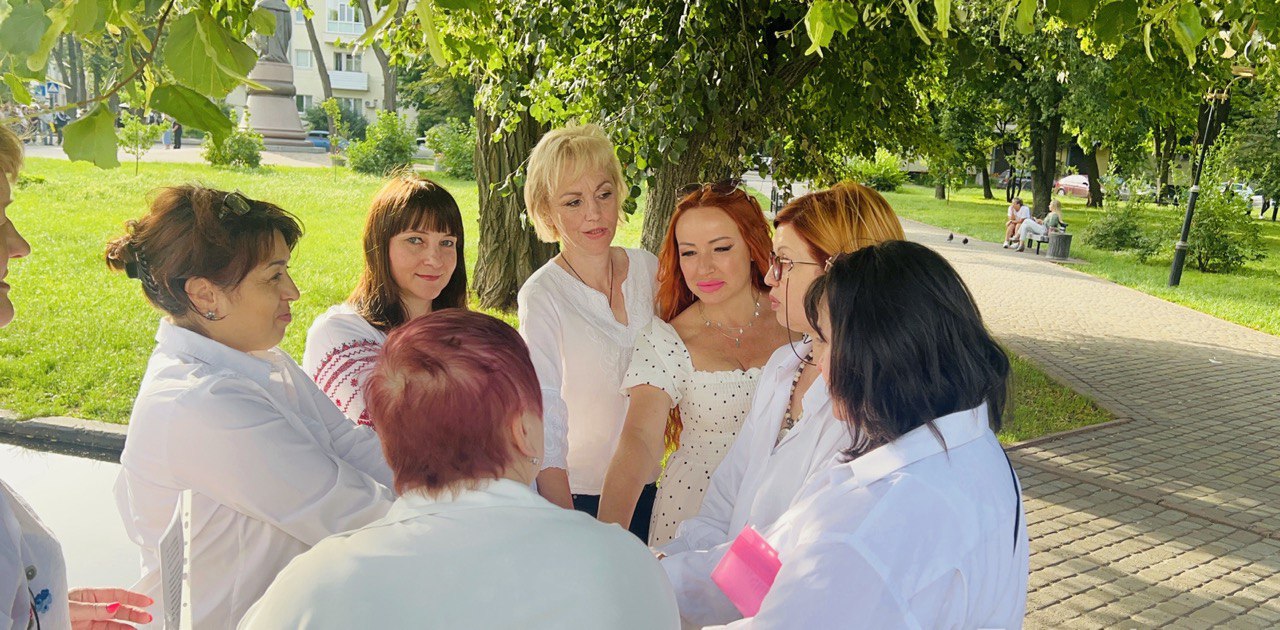
Resettled women participating in the forum theater "Shirtless".
What is the solution?
Now, Podosetnykova is relatively safe. She learns to live the moment to the fullest, rejoicing in the little things, grateful every day she has the opportunity to greet the sun. She and seven other displaced women who are currently in Poltava are not afraid to share their experiences of the war and hope for the future. Forced resettlers like her are sure that this is not only necessary for them, but they are ready and want to tell their war stories and share the transformations happening to them. The volunteer-run forum theater project "Shirtless" gives them this opportunity to use their voice.
Its curator, Inna Yakobenko, told Rubryka how and why the forum-theater was created.
How does it work?
Speaking and being heard is important
Yakobenko, a native of Poltava, is a former journalist who worked in the profession for over 25 years, 15 of them as the director of Poltava Regional Radio. She left journalism during the term of Ukraine's ex-president Viktor Yanukovych — she did not want to voice the dark things imposed by the authorities of the time. Over time, she found a new profession in finance and insurance, and since 2014, she has been an active volunteer of the Poltava Nebayduzhyh Battalion.
In the Nebayduzhyh Battalion, Yakobenko worked with humanitarian assistance and logistics for the first three months after Russia invaded Ukraine. Then, she was invited to work permanently in one of the humanitarian missions operating under the auspices of the United Nations, focusing on places of compact residence (PCRs) for people who have been displaced from their homes in Ukraine.
"In half a year, I visited 150 PCRs; I knew many of the displaced persons personally," says Yakobenko. "Since the new year, I have been transferred to the Global Camp Coordination and Camp Management (CCCM) cluster, the next level — my work is no longer about pillows, beds, mattresses, but about everything related to deep assimilation: studying employment applications, extra-curricular activities for children, courses for adults, psychological support, various activities. Talking with displaced people, we asked them what they would like – it was then that the idea of a theater appeared. I was passionate about this idea and suggested that it be included in the action plan of the mission as one of the types of psycho-emotional relief," she told Rubryka.
The format of a forum-theater, in which the actors and screenwriters are not professionals but ordinary people in difficult life circumstances, was chosen not by chance. This interactive form of theater gives participants an opportunity not only to gain awareness of the problem and form an attitude towards it, but also to find ways out of a difficult situation using one's own experience and the experience of other people. Yakobenko began to work with displaced women in this area — she spoke with them, wrote essays, and developed a script. But two months later, unexpectedly for Yakobenko and the actresses of the theater in the making — so they decided to stop the project. According to Yakobenko, the verdict was ruthless: "We believe that this IDP project is unnecessary." Yakobenko tried to defend the idea but did not receive support.
"I realized that there is no point in once again proving the obvious. An international organization sent us manuals that described the African experience. Sometimes, they tried to transfer their content word for word without changes to our territories, where it is irrelevant," Yakobenko sighs. "I got up and left – but decided I would still do this project. I saw that it was important for my girls to have their own theater, to talk about the war from the stage, to receive consolation, support, and feedback from other people who have similar experiences," says Yakobenko.
"Everything we show on stage is only the tip of the iceberg"
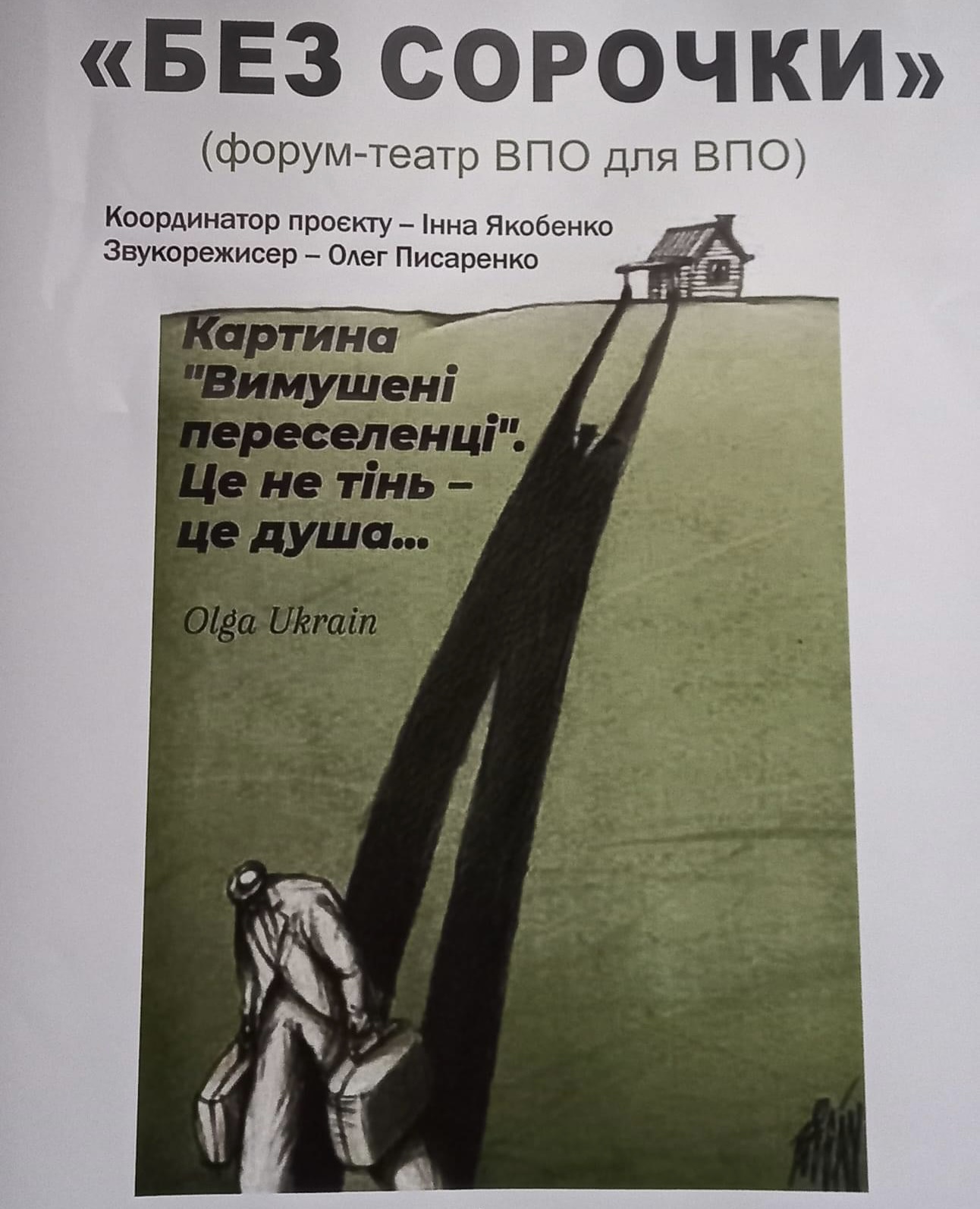
Poster of the forum-theater project for IDPs Shirtless.
At first, Yakobenko wanted to call the project "A play to grow into" — with the idea that new participants might want to join the existing team. But in the end, the project's name, like its idea itself, arose spontaneously, when Yakobenko received a book by the Ukrainian poet Natalka Fursa as a gift during rehearsals.
"I opened the parcel at the post office and read the cover — "Shirtless." And then — a gift inscription: 'May you be a little warmer in this world, even without a material shirt — from the warmth of human hearts!'. I thought — this is exactly what I wanted when I conceived this project — to introduce people who Poltava sheltered to each other, fill their lives with new emotions, desires, and hopes," Yakobenko recalls. "I wanted to write out their stories so that each one has a 'light at the end of the tunnel,' poke tiny holes in the frozen windows of our souls to see what motivations can be held on to."
The curator of the project offered the amateur actresses to adapt the texts of Ukrainian writers who were living witnesses of this war for the theater's first performance. Having received the authors' permission, she made two versions of the scenarios. The participants then said: "We don't want to tell other people's stories. Can we tell ours?" – it turned out to be the right decision.
Today, in the forum theater "Shirtless," each person presents their memory related to their displacement at the beginning of the full-scale invasion. The women do not like the term
"IDPs", so Yakobenko calls them simply — my girls. At first, there were long conversations with everyone. Then Yakobenko transformed the stories she had heard into an essay. At the same time, the project participants learned the art of recitation. They wrote down 12 stories, but not everyone was able to tell them publicly.
"What we show on stage is only the tip of the iceberg," says the project curator. "We simply did not bring many details to the stage. They are too painful," says Yakobenko.
Four women — four stories
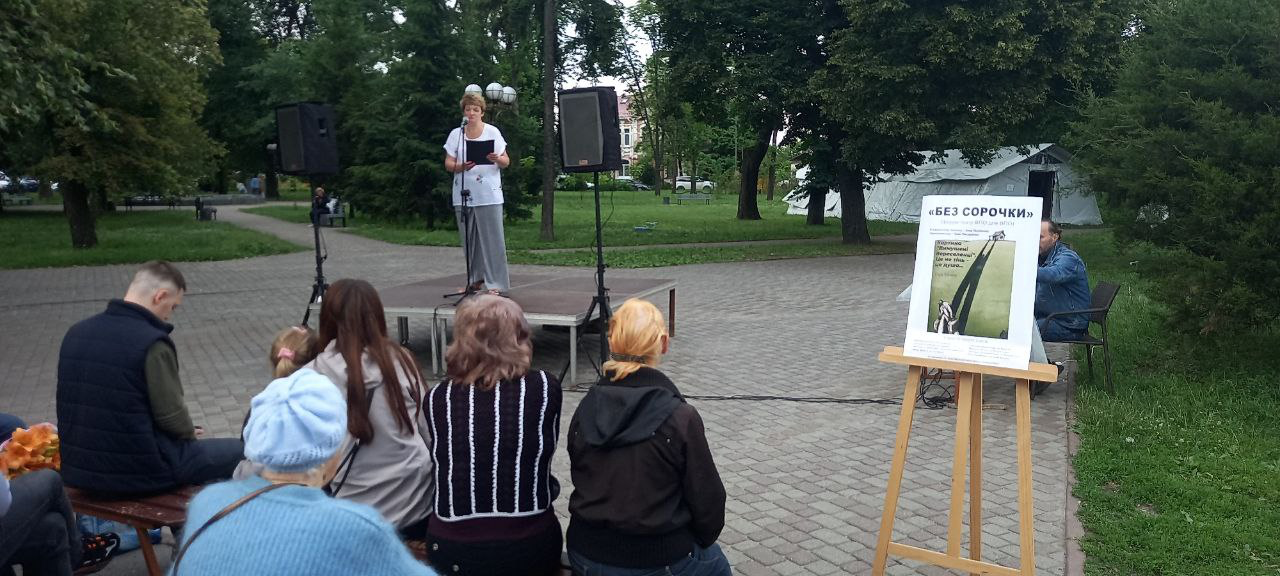
Svitlana Bakadzhyeva from Berdyansk tells her story from the stage. Photo: Inna Yakobenko
Forum theater participant Svitlana Bakadzhyeva is from the city of Berdyansk, which has been under Russian occupation since February 27, 2022. Before the war, Bakadzhyeva worked in the state social sector. She says that during her work, she saw some people as waiting for someone to come and feed them from a "golden spoon."
Her personal story is also about how the "line of war" runs not just across the country but across her own family. Bakadzhyeva and her daughters could not live under Russian occupation, and relocated to the city of Poltava as soon as they could in July — but her husband and his parents stayed in Berdyansk.
Poltava received Bakadzhyeva's family well. Thanks to Yakobenko, Bakadzhieva not only got on the stage of the theater but also got a job in a small charity bakery. Still, almost every night, Bakadzhyeva dreams of the sea that she left behind in her hometown. With all its sounds and smells, and lush palette of colors at different times of the year.
"I just close my eyes — it seems to be so close. It seems that this is your biggest wish — to touch this saltwater," Bakadzhyeva shared with Rubryka. "Although… no, I want victory the most! I have no idea what I will do when I hear about it! Probably, I will fall on my knees and thank God, our defenders, everyone who brought it closer, everyone who believed and did something for this. I will thank everyone who paid such a terrible price for it."
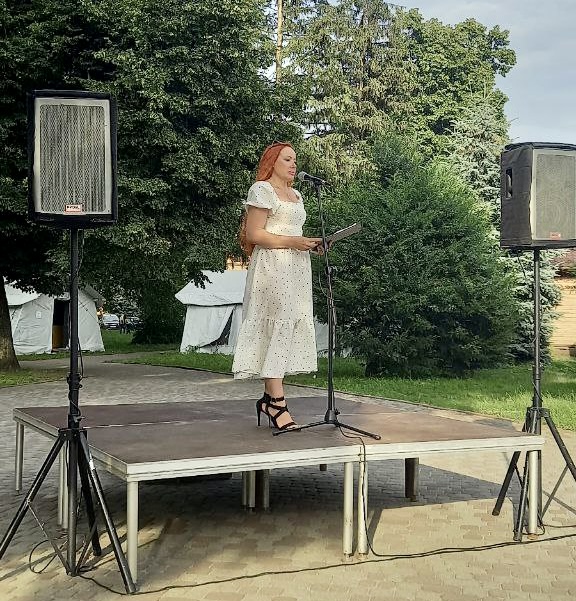
Maryna is from Popasnaya: "I have to keep my students with my spirit." Photo: Inna Yakobenko
Another participant in the theater, Maryna, is from Popasnaya, a city that the war reached back in the summer of 2014 when it was bombed for the first time. Marina was the director of Lyceum No. 21 in Popasnaya. In September 2014, a shell exploded near Maryna's father: he was wounded, and his diaphragm was torn. He was saved, but the life of the vocalist, the "golden voice of Luhansk region," lost its meaning. Maryna was also injured. Reminders of these events are colored tattoos in place of scars. Maryna often hears: "Wow, you are so fashionable!" then she tries to joke: "Did I want to be? I had to!"
The line where the occupation began in 2014 was just a few kilometers from the city. In 2014, people began to leave Popasnaya, with a population of 30,000, en masse. Then, in 2016, they began to return little by little. Already in 2018, the city started to change before our eyes: all schools, kindergartens, and roads were renovated, and landscaping was carried out. Neighboring Pervomaisk, which had been under occupation since 2014, was rapidly deteriorating.
Maryna says that those who came from there to the unoccupied territory for the Ukrainian pension were sincerely jealous of the residents of Popasnaya. But then, Russia's full-scale invasion began.
Maryna recalls: "I cannot look at the ruins of Popasnaya, a city that remains only on paper. I really regret that I didn't take the office equipment out of the lyceum, which I literally gnawed on for the institution with my teeth. Then I was driving in some kind of warm pajamas and torn sneakers, and for the 15 minutes until we left the city, I was praying. It was like an unreal picture of Armageddon: everything around was burning, blasting, howling, and screeching. My lyceum was burning with a tall black column of smoke and fire."
Now, Maryna and her lyceum work remotely. All her colleagues are in Ukraine, and no one collaborated with the occupiers. Here, in Poltava, the director occasionally asks to go to one of the local schools — just to walk through the corridors to hear the children's noise, to breathe in the school air.
"Every day, when I go online, I tell my students that they are the best, the bravest, and that we will all definitely come back home," Maryna sadly smiles. She promises to go first, remove all the garbage, and wait for them there. Then, the director goes to bed and cries herself to sleep. But the kids don't know about it."I have to keep them with my spirit, and I can do it," says the director.
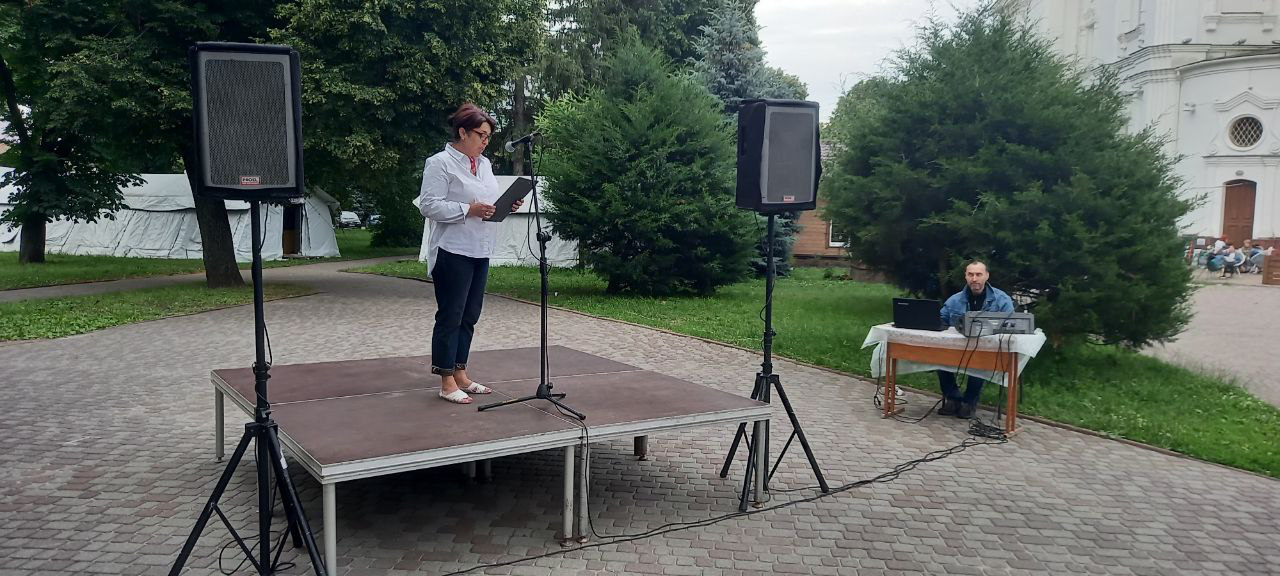
Yuliia is from Sloviansk, and in Poltava, she became a volunteer. Photo: Inna Yakobenko
Yuliia is from Sloviansk. She is a speech therapist teacher and has worked with children all her life. While developing her family's "plan A" and "plan B" in case of war, Yuliia even packed first-aid kits so that it was possible to help children. Unfortunately, the plans did not work out. In the shops, everything disappeared very quickly when the Russians came. As soon as they could get fuel, Yuliia's family left their once cozy, peaceful native city to nowhere. The car was stuffed with their treasures: pillows, blankets, and bed linen. The war changed the perception of the value of things.
Already in Poltava, they had been exhaling stress for a month — they just walked 15-17 km every day, as if they wanted "to trample the damn war," Yuliia recalls and admits: "It's not easy." Her parents and sister are in the occupied territory near Mariupol. The nephew, her sister's son, served in the Azov regiment and has been in captivity for over a year.
"I find it insulting to hear, even in Poltava, 'those IDPs.' We work, pay for an apartment, and care for our mother-in-law, who has limited mobility. We are normal and healthy. Recently, at one of the training sessions, I heard an expression now popular in the social sphere — 'people who have fallen into difficult life circumstances.' Well, yes, it's about us," Yuliia shares with Rubryka. Labor relations with the teachers were interrupted on September 1, 2022. Yuliia shares that she does not feel the protection of the state, unfortunately. Ordinary people, however, support the family as much as they can.
From the first months in Poltava, Yuliia has been active in a volunteer group — she helps children with inclusion because she can't help — she is a hyper-empath, and this is exactly what her profession is all about — a teacher cannot be detached from children.
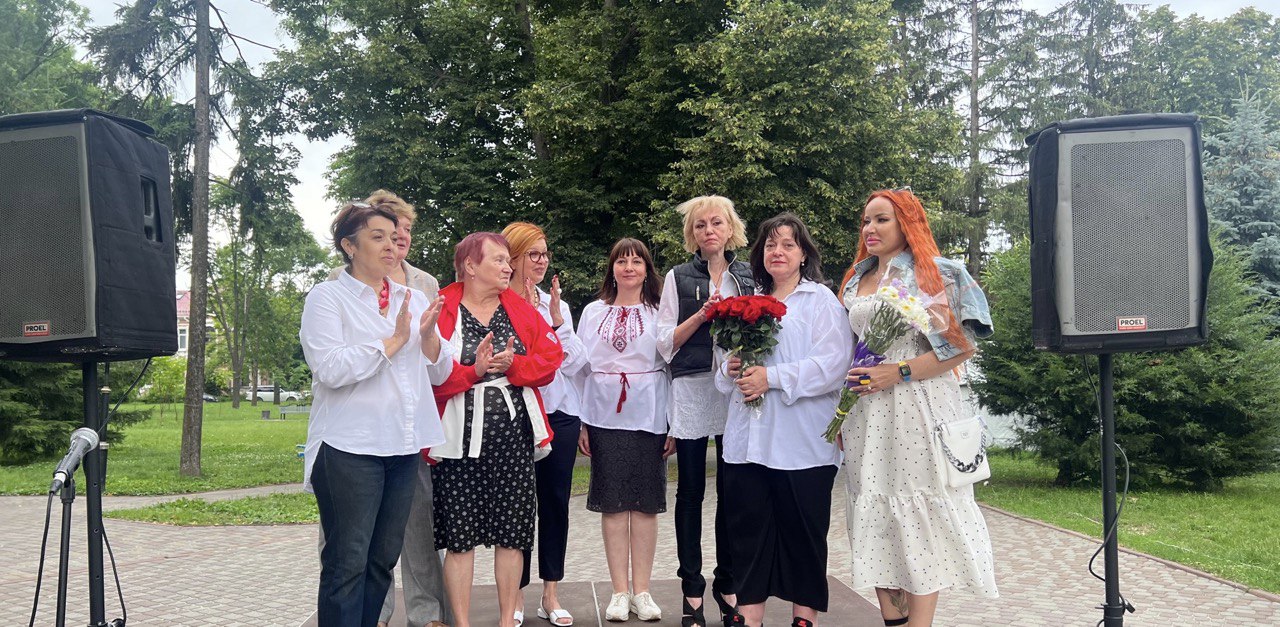
Participants of the Poltava forum-theater. Photo: Inna Yakobenko
Olena, from Novoaidar in the Luhansk region, also joined the volunteer movement in a new city. She says that when you are busy with something, morally, it becomes easier. Olena left her village the day before the war, before the occupation, because she felt that something terrible, inevitable, was coming. Now, she is putting herself together piece by piece, as if anew. She is engaged in graphic design; she says that creativity is an incredible therapist for her. Olena, an avid dog lover, is now raising a kitten, Bonya, from Kharkiv. This, too, is a therapy that is always at hand.
"For these one and a half years, we all burned out and got old," says Olena. "The war erased our faces, but it should not erase our souls. We must fight for it! Once, we received a request at the volunteer tent with clothes to quickly collect clothes for Russian prisoners of war. Many girls flatly refused to do this (and I understand them!) I even cried — I was so torn from the middle of the contradiction: no one does that for Ukrainian soldiers, and we have to dress the Russians," Olena bitterly recalls. "There was a chaplain nearby, and I am very grateful to him for the words that kept me then and keep me now: 'We are not like that. We must remain human!'"
Does it really work?
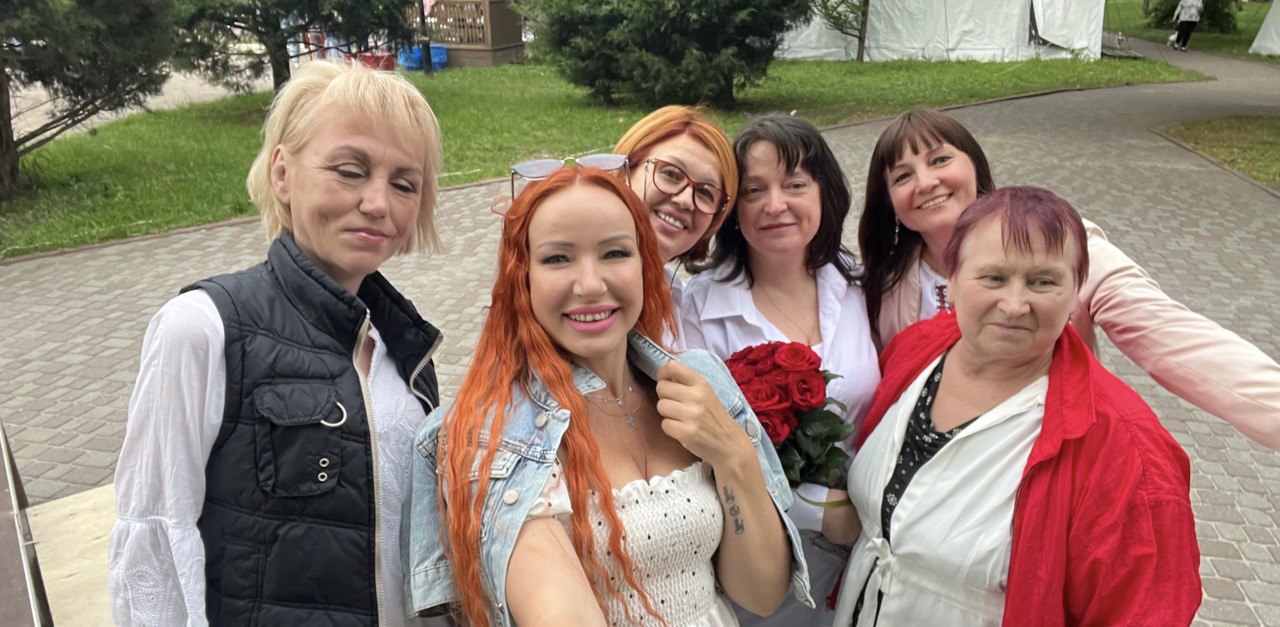
Participation in the project became an emotional consolation for the participants. Photo: Inna Yakobenko
"When you tell a painful story several times, the concentration of 'hydrochloric acid' that eats away at you from the inside dissipates a little, and it doesn't hurt as much," says Yakobenko. Forum theater allows participants not only to heal some of their past experiences but also to appeal to the public, share with the audience, and receive feedback. Among themselves, the participants, listening to each other's stories, shared their emotions, their impressions, and options for actions that they could take.
The premiere of the performance of the volunteer project of the forum theater Shirtless took place on June 28, on the Constitution Day of Ukraine. Many Poltava residents helped make the idea of resettlers a reality: the project received support from the Poltava Battalion of Caring, and sound engineer Oleh Pysarenko made a soundtrack for each performance free of charge and brought his own equipment.
The forum-theater idea worked not only as a format for psycho-emotional relief but also as an element of gentle Ukrainization — almost all project participants communicated in Russian before participating. The project helped them to feel the language and believe that they, too, will be able to speak Ukrainian fluently.
The participants agreed they would continue to perform. Now, they communicate with each other and gather for coffee. Together with Yakobenko, they are going on an excursion to Opishnia — one of the places of strength in the Poltava region, and with the Poltava Battalion of Caring to arrange a photo shoot in national dress. Yakobenko also created a Telegram group for communication. Yakobenko says the project is open, and if someone wants to join the forum theater and is ready to share their own story or help — such people will always be welcome in the theater.
"For me, this project has become a kind of lifesaver, an emotional consolation," says Yakobenko. "What did I expect from the project for the participants? I expected they would get to know each other, start to communicate, and learn more about the city, in which, perhaps, some will stay to live. I really wanted them to feel a little warmer in their hearts."
Then Yakobenko recalls the words of the participants:
- "I realized today that I want to wear a dress for the first time since the start of the war. I want to paint. I want to look good. I realized that I remembered the word 'want!'.
- "The last time I performed somewhere was probably when I was still at school. Such an unexpected experience, not easy, but I am so grateful for it!"
- "This is the best thing that has happened to me in the last year."
"The participants shared such impressions after the performance over tea, and I thought that everything was not in vain," smiles the head of the project.


